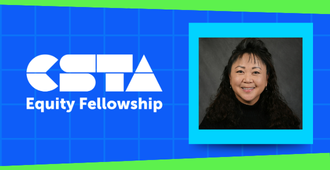Leah Aiwohi teaches media production, computer science, and STEM education at Kaua‘i High School in Lihue, HI. A public school educator with 34 years of experience, Leah has taught at the elementary, middle, and high school levels. She is dedicated to keeping up with the ever-changing landscape of education and has involved herself in ongoing STEM and media education at the state and national levels. She received a CS Leaders Prize from Code.org in 2022–23, she was named a PBS All-Star Digital Innovator, and she recently joined the first cohort of Amazon Future Engineers Teacher Ambassadors. Additionally, for the second time in her teaching career (first in 2001), Leah has been named the 2025 Teacher of the Year for Kauai Island.
Living and teaching on one of the more remote “outer-islands” of the state of Hawai‘i, Leah has personally experienced the impact of inequities in education. Her island is 25 miles long by 33 miles wide, and many of her students haven’t had the opportunity to travel away from that home island to the rest of the state, let alone to travel to the mainland or the rest of the world. She admits that it’s hard “to provide our students with the kinds of resources that can help them succeed as globally viable professionals.”
Undaunted by that challenge, Leah has taken it upon herself to broaden her students’ horizons throughout her teaching career. She has always worked hard to integrate technology into her teaching practice as a means of allowing her students to connect with the wider world. In her very first year of teaching, she bought the classroom’s first computer and established an e-pals program where her students would correspond with students from other states. Her earliest years of teaching allowed students to learn basic computer literacy through word processing programs, internet research, and data analysis using spreadsheets. By her fifth year as a teacher, her students were gaining local and national recognition through participation in web-based competitions.
Leah built on this success to establish beginning and advanced computer labs at the middle school level. When she moved to the high school, she established new career-technical education pathways and integrated technology into those programs of study, too. Building capacity for computer science has been an ongoing challenge, as Leah tried to reach students beyond just those enrolled in her classes. She has had to be proactive about nurturing relationships and sharing resources with her colleagues as she encouraged them to integrate technology in their classrooms. Once the spark was lit on her campus, however, Leah began to feel more and more optimistic about including tech across subject areas. She says, “I’ve personally discovered that opening myself up and welcoming ideas from other professionals can be such a valuable resource. I want to build similar experiences for my students and colleagues.”
Leah is proud to say that she has never been satisfied with the status quo. She wants to provide her students with the kind of unflagging support she received from her parents, which she believes helped to foster her resilience, confidence, and independence. STEM and CS should truly be for all students, in Leah’s mind, and she continues to seek out ways to improve her skills and expand her reach. She regularly pursues new teaching credentials and is Highly Qualified to teach in a variety of subjects at the elementary, middle, and high school levels. For the last five years, she has been a lead GenCyber teacher at the University of Hawai‘i; she is a teacher mentor with ASU’s CompuGirls program; and she has been a STEMworks Hawaii facilitator since 2000. She serves on her state’s computer science work group, and she is an advisory board member for Hawaii’s new CTE Pathway for Information Technology and standards development work group.
Leah is thrilled to be a CSTA Equity Fellow. She recognizes that none of her work would have been possible without the networks of support and collaboration she has established around herself. She hopes to learn from her cohort about the strategies and tools they’ve used to improve their practice, and to share her own experiences of building computer science capacity in her state.
One project that Leah is eager to undertake is the creation of a dashboard to compare CS efforts across the country. She would love to bring attention to “what the CS tapestry in our country looks like,” and she knows that having access to such data would make it easier to elevate CS in the minds of decision-makers at every level. She would also love to explore the possibility of creating computer science day camps where older students could take on leadership roles to support the CS learning and exploration of younger students. This summer, she piloted a two-day CS camp for elementary students, where colleagues and older students pitched in to help kids complete hands-on activities that taught computational thinking, programming, and physical computing. The camp was a huge success, and Leah is eager to use similar events to build awareness and excitement about computer science.
Leah hopes that her time as a CSTA Equity Fellow will help her to develop her network of likeminded collaborators and build out her toolkit for bringing computer science to students at every level on her home island.


